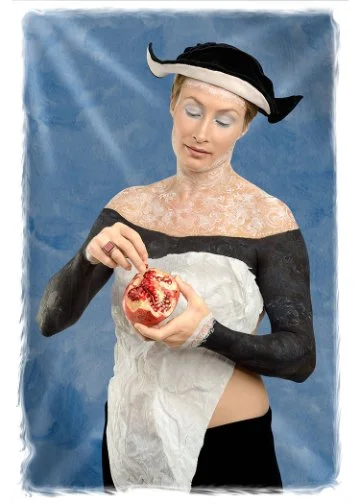A PASSION PLAY
- text by John K. Grande
Packaging personalities, painting with photos, Rouge Lefebvre’s
Les Nonnes series captures a lot of atmospheres, builds a
tension using age-old conventions. By combining the traditional
portrait as stage set for posterity with unconventional
costumes, models whose faces are as pure as the driven snow, or
women with presence, she builds a universal language we can all
access that touches on contemporary life. She works from live
models. The process of dressing them, make up, composing, all
adds to the photo moment. The portrait image in these works
exists against a background that is openly constructed, built as
a two-dimensional stage with its own material contrasts,
juxtapositions, and elements. These elements exist to heighten
the “historicity” of the portrait image, a notion that exists
outside time, no matter when it was painted or photographed. The
portrait becomes a commodity, exchanged within a hierarchy of
contexts, and the “historicity” Rouge Lefebvre gently directs us
to is relative and continuous. As in all eras, whether Medieval
or Baroque, or Neoclassic or contemporary post-Pop, portraits
are fictional truths. Rouge Lefebvre manipulates portraiture,
the iconic image to achieve a value that infuses religious,
sexual, and political hidden meanings into the art, as it always
has and will in the future.
Her process involves the way the images are put together, the
way they are compositionally set. Often the portraits are in
spaces that are immediate and layered. The imagery itself
becomes a form of packaging. There are shades of Romanticism, a
Baroque capacity to embroider and decorate, to describe space
using illusionary effects of lighting, and décor. These
conventions of portraiture that go back to Ingres and Cranach,
to name but two of art history’s pantheon of portraitists.
The use of light, of religious icons, all contribute to a
dialogue on representation and what imagery as portraiture
represents. Power becomes central to the stories that are told
here. Rouge Lefebvre does this in a way that is seductive: from
all of this combines purity, nostalgia, beauty, costume,
tonality, to make a statement about women's inner power. She
does so in a way that engages all of us, with a spirit of
inquiry. She asks us all to look into what the portrait image
represents… Isn’t every portrait a fiction? Does not every
portrait tell a story of the subject, whether powerful, pedantic
or youthful? Interestingly, she chooses people from her
everyday, whatever their age or background, for their input as
“found materials”, in an aesthetic of happenstance and organic
creation. We know nothing of their history, or where they come
from. Yet there is a fairytale aspect to her conception, to the
playful paper costumes, make up and body painting, in her
presentation of her subjects, and disguise and nature likewise
play a role. As the lighting adapts and contains, these people
become photo icons of today’s world where the image supersedes
reality. These works are like paintings, through the medium is
photographic. Elements are assembled, the clothing, the colour,
the frontal or angular arrangements. As images they are tightly
manicured, manufactured in scenes besieged by lighting, and
carry a dramatic, even Romantic tension. One woman appears as if
she were the Pope, but locked into her fashion statement too.
Rouge Lefebvre’s art plays with sublimated desires now made
explicit, and causes us to question what is sacred and what is
not sacred, and why. It’s a passion play where art is as close
to advertising as the old portraits once were, statements of
social and cultural wealth, position, a language as strategic as
it was a forum for revealing truths that lie behind the fiction.
At some point the two come together, merge, are the same thing.















